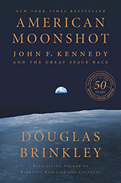
 |
American Moonshot: John F. Kennedy and the Great Space Race
by Douglas Brinkley
Harpers
Famous for making a “giant leap for mankind” upon the lunar surface, the US space program was in fact built with small steps. It began with the great minds of earlier centuries and the brainchildren of inventors and tinkerers. By the time John F. Kennedy took the reins of the Presidency and a splintered military push for rockets, an approach for the moon had already been discussed and often been dismissed within the higher circles of scientists and pundits. Then the first Russian Vostok missions occurred, solidifying a presidency as well as defining a purpose for America in space. Reaching the Moon would “leapfrog” Krushev’s accomplishments and threats. In many ways, the free world drew focus for the first time since WWII, lifting three astronauts to the Moon and etching a new high water mark for humanity that for fifty years remains unduplicated and unsurpassed.
In American Moonshoot, historian and deep narrative journalist Brinkley braids the stories of JFK with the US Moon landing. There exists glory and tragedy in both, and eventually JFK’s ghost hung over everything. Like war itself, much blood and treasure were spent along the way. When Neil Armstrong pressed boots on the Moon for the first time, it was the fulfillment of Kennedy’s mandate. This was in spite of the fact that the program had passed through the stewardship of Presidents Johnson and Nixon—both having profited from the effort and achievement in various ways.
While Brinkley’s detailed narrative lacks the immediacy of The Great Deluge, his seminal work on the human tragedy of Hurricane Katrina, he picks his spots to reveal the humanity of JFK and the people who made the Moon missions possible. That is perhaps one of the author’s best skills—to hold a mirror to us without judgment and let the facts speak on their own—a dying art in journalism. For that alone, this book is worth the read and maybe its selection above others. Alan Shepard’s and Deke Slayton’s heavily ghostwritten, Moonshoot, will always be a favorite for the astronaut’s insider view of rockets, although tightly focused on just the Apollo Program. Brinkley’s palette is a broader and more revealing worldview of the space effort in general.
Few books delve into the true genesis of the space race—beginning immediately after WWII with the seizure of German rocket scientists—with Brinkley’s aplomb. The pacing early on is historically slower and less dramatic, though none less essential to understanding how the space race evolved from military experiments into a civilian force idolized by the world. This is perhaps why many narratives begin late in the process with the famous Mercury Seven astronauts, when in large part the tone and ambitions of the US effort were already set. For those retellings, it’s almost as if astronauts and rockets suddenly arrived in the early sixties. Brinkley rightly reveals that nothing was further from the truth. The building toward the eventual Moon landing had begun two decades earlier in technological growth and at least a century earlier within the hearts and aspirations of scientists and artists alike. The achievement, if eventually surpassed, will remain a landmark.
RECOMMENDED by the US Review
Next Focus Review
Previous Focus Review